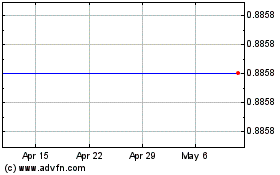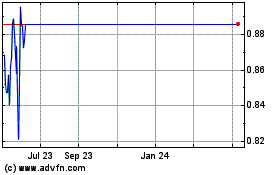Judge Orders Credit Suisse to Pay Highland $287.5 Million in Suit Over Loan -- Update
September 04 2015 - 11:49PM
Dow Jones News
By Joseph Checkler
A judge on Friday said Credit Suisse must pay a unit of Highland
Capital Management $287.5 million over a soured real-estate loan, a
win for James Dondero's hedge-fund firm in its multipronged fight
against the Swiss bank over luxury developments.
Judge Dale B. Tillery of U.S. District Court in Dallas County,
Texas, said Credit Suisse must pay $211.9 million in damages and
restitution and $75.6 million in prejudgment damages and interest
for breach of contract on a loan tied to the Lake Las Vegas planned
community, which went into bankruptcy in 2008.
"We respectfully disagree with the court's decision and intend
to pursue all available options to vindicate ourselves in this
matter," said Nicole Sharp, a Credit Suisse spokeswoman.
In an emailed statement, Highland spokesman Tom Becker said: "We
are pleased the Texas State Court ruled in our favor on all claims
and agreed with us that Credit Suisse not only committed fraud and
other torts, but also breached the terms of a contract with certain
Highland funds when it committed a massive and systematic fraud,
costing investors of the Lake Las Vegas development hundreds of
millions of dollars."
The case was tied to a $40 million award against Credit Suisse
and property appraisers over inflated appraisals used for the
development projects. Highland sought an award from Judge Tillery
of another $340 million, in connection with a Texas jury's finding
that Credit Suisse committed fraud in connection with appraisals
for the Lake Las Vegas loans. Highland is now entitled to either
the $40 million or the $287.5 million, but not both.
Highland has filed multiple suits against Credit Suisse to try
to recoup losses from the bank's ill-fated loan program to
developers of luxury properties in the U.S.
The dispute dates back to the early part of the past decade,
when resort communities catering to the wealthy sprouted across the
West. Credit Suisse marketed loans to about a dozen of the
projects' owners, who could pocket a chunk of the proceeds as a
dividend or a loan.
The bank would then arrange financing for the loans from nonbank
sources like private-equity firms, hedge funds (like Highland) and
debt-fund managers. In return, the lenders would get exposure to a
market for high-end real estate. The bank served as the middleman,
collecting tens of millions of dollars in fees from the
transactions.
Eventually, all the properties collapsed into bankruptcy or were
forced to restructure, resulting in hundreds of millions of dollars
in losses for investors. Credit Suisse ended up buying many of the
properties at discounted rates after they collapsed.
Patrick Fitzgerald contributed to this article.
Write to Joseph Checkler at joseph.checkler@wsj.com
Subscribe to WSJ: http://online.wsj.com?mod=djnwires
(END) Dow Jones Newswires
September 04, 2015 23:34 ET (03:34 GMT)
Copyright (c) 2015 Dow Jones & Company, Inc.
Credit Suisse (NYSE:CS)
Historical Stock Chart
From Mar 2024 to Apr 2024

Credit Suisse (NYSE:CS)
Historical Stock Chart
From Apr 2023 to Apr 2024
